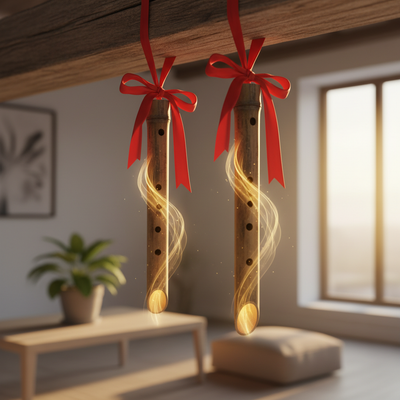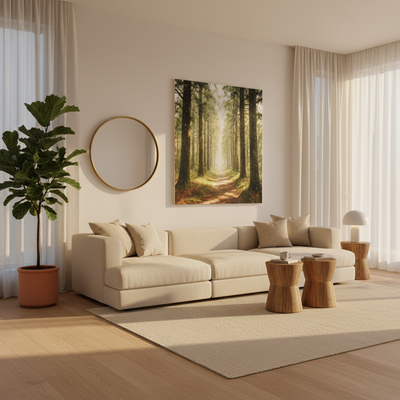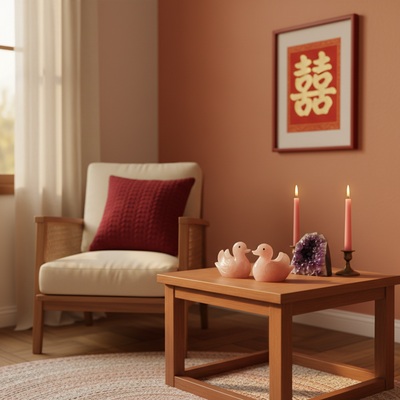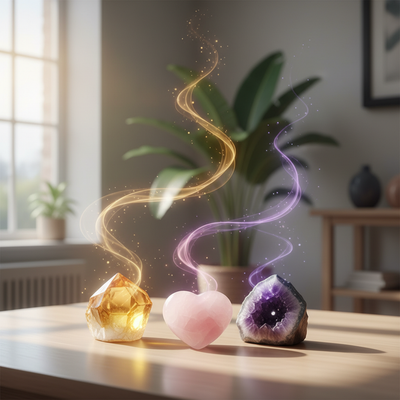Why Bedroom Feng Shui Matters

Do you wake up feeling tired even after sleeping all night? Does your personal space feel messy instead of peaceful? You are not alone. The place where we sleep has a big impact on our energy, health, and how we feel. This is where the ancient practice of feng shui can help.
Think of bedroom feng shui tips not as mysterious rules, but as practical ways to arrange your room to support your personal energy, called Qi. Your bedroom is the most personal room in your home. It's where you rest, recharge, and feel most vulnerable. When its energy is balanced and peaceful, it can become a true safe space.
The goal is to create a room that helps you sleep deeply, builds closer relationships, and serves as a shelter from outside stress. The connection between your environment and sleep is real. According to the Sleep Foundation, things like light, noise, and comfort are important for healthy sleep. Feng shui goes further by organizing the invisible energies of the room to work for you, not against you.
The benefits of using these ideas are real:
* Better and more refreshing sleep
* Less stress and worry
* Stronger relationships and connection
* A greater sense of personal balance and well-being
In this guide, we will walk you through simple, doable tips to transform your bedroom into a powerful source of positive energy.
Mastering the Command Position
The most important rule in bedroom feng shui tips is placing your bed in the Command Position. This idea is essential because it connects to our basic need for safety and awareness, directly affecting how deeply we can relax.
What is the Command Position?
The Command Position is the spot in a room that gives you the best view of the door without being directly in front of it. From this place, you can see anyone entering the room, which tells your nervous system that you are safe and in control. When you can't see the door, you stay slightly alert all the time, which can prevent deep sleep and cause anxiety. You want to see opportunity (and possible threats) coming, but not be hit by them directly.
[Image: A simple diagram showing the Command Position with the bed diagonal to the door, and weak positions like being in line with the door or under a window.]
The Best Bed Placement
Use this checklist to see if your bed is in a good position. The best placement is:
- You can see the bedroom door from your bed while lying down.
- You are not directly in line with the doorway. Energy (Qi) rushes in through the door and you don't want your bed to be in its direct path.
- The head of the bed is against a solid wall. This gives a sense of support, stability, and grounding.
- There is space on both sides of the bed (if you are in a relationship) to promote equality and balanced energy flow.
- You are not positioned directly under a window, as this can feel less secure and allow your personal Qi to escape.
When Perfect Isn't Possible
Not every room allows for the perfect Command Position. If your bed is in a difficult spot, don't worry. Feng shui is about solutions, not strict rules.
-
If you cannot see the door from your bed: Place a mirror at an angle that lets you see a reflection of the door from your pillow. The mirror should be good quality and should not face the bed directly if possible.
-
If your bed is in line with the door (the "coffin position"): If you cannot move the bed, hang a crystal ball from the ceiling halfway between the door and your bed. This helps to slow down the fast-moving Qi before it reaches you.
-
If your bed is under a window: Make sure you have a very solid, tall headboard to create a sense of support. Using heavy, solid curtains or blinds that you close at night also helps create a more secure feeling.
Declutter for Positive Energy
If the Command Position is the foundation, decluttering is the essential first step to building a peaceful space. In feng shui, clutter is more than just physical mess; it represents stuck energy, unfinished business, and mental baggage that can drain your energy. A cluttered bedroom leads to a cluttered mind, making true rest impossible.
How Clutter Drains You
Every object in your space holds a certain energy. Piles of old magazines, clothes that don't fit, and unfinished projects create a constant, low-level stress. This stuck Qi blocks the positive, refreshing energy from moving freely, leaving you feeling trapped, overwhelmed, and tired. Clearing out this physical and energetic mess is like a deep breath for your room and for your mind.
The Under-the-Bed Rule
The area under your bed is especially important. For the best feng shui, this space should be completely empty and clean. This allows Qi to flow freely around you as you sleep, promoting healing and renewal. Storing items under the bed can block this flow and energetically connect you to whatever is stored there.
Never store these items under your bed:
* Items with emotional baggage (like letters from an ex-partner, old photos).
* Shoes (you'll be "walking" all night instead of resting).
* Weapons or sharp objects.
* Luggage (represents constant movement, not rest).
* Anything broken or unused.
If you absolutely must use this space for storage because of a small living area, stick to soft items related to sleep, such as clean sheets, blankets, and pillows.
A 3-Step Declutter Method
Set aside a weekend and follow this simple process to clean up your sanctuary.
- Start Fresh: Completely empty one area at a time, like your closet or nightstand. Wipe down all surfaces to physically and energetically clean the space.
- Sort with Purpose: Create three piles—Keep, Donate, and Throw Away. For each item, ask yourself: "Do I love this? Do I use this? Does this support the person I want to be?" Be tough.
- Organize and Remove: Put back only what you are keeping in an organized way. Immediately remove the "Donate" and "Throw Away" bags from your bedroom, and preferably, from your home.
| Category | Keep | Donate | Throw Away |
|---|---|---|---|
| Clothes | Fits well, feels good, worn in the last year. | Good condition, no longer your style or size. | Stained, torn, or worn out. |
| Books | Currently reading, a favorite, or for reference. | Read and won't read again. | Damaged beyond repair. |
| Papers | Important documents (store elsewhere if possible). | Old magazines, expired coupons, junk mail. | Shred and recycle. |
| Keepsakes | Creates genuinely happy and positive memories. | Creates sadness, guilt, or negative feelings. | Broken or meaningless items. |
Essential Do's and Don'ts
Beyond bed placement and clutter, many smaller elements contribute to your bedroom's overall energy. Here is an easy guide to the essential do's and don'ts for creating a peaceful space.
| The Do's | The Why |
|---|---|
| Invest in a Solid Headboard | A strong, solid headboard (preferably wood or upholstered) provides a feeling of support and stability in your life and relationships. Avoid headboards with bars, which can feel like you are "imprisoned." |
| Choose a Balanced Bed Frame | Your bed frame should be at a good height, allowing energy to move underneath. Avoid placing a mattress directly on the floor, as this can lead to stuck energy. |
| Use Pairs for Balance | To promote partnership and relationship harmony, create balance. Use two nightstands and two lamps, even if you are single. This creates space and invites partner energy. |
| Use Calming Colors | Choose "skin-tone" colors, from light white and beige to rich chocolate browns. Earthy tones, soft blues, and gentle greens are also excellent for promoting rest and relaxation. |
| Use Soft, Layered Lighting | Avoid harsh, overhead lighting. Use a combination of lamps with dimmers and soft, warm bulbs to adjust the mood and energy of the room from bright and functional to soft and restful. |
| Choose Inspiring Artwork | The art in your bedroom should be uplifting, calming, or romantic. Choose images that reflect what you want to grow in your life, such as happy couples, peaceful landscapes, or inspiring abstract pieces. |
| The Don'ts | The Why |
|---|---|
| Don't Place Mirrors Facing the Bed | A mirror facing the bed is said to bounce too much energy around the room, disrupting sleep. It can also symbolically invite a third party into a relationship. If you can't move it, cover it with a beautiful cloth at night. |
| Don't Sleep Under Beams | Heavy overhead beams or slanted ceilings can create a "crushing" or heavy energy that weighs down on you while you sleep, potentially leading to headaches or health issues. A simple fix is to install a fabric canopy to soften the effect. |
| Don't Keep Electronics Near the Bed | The electromagnetic fields (EMFs) and blue light from phones, TVs, and laptops disrupt your personal Qi and interfere with melatonin production, harming your sleep quality. Create a charging station across the room. |
| Don't Have Water Features | While calming in other areas of the home, active water elements (like fountains or large images of oceans) bring a worried or "too active" energy into a space meant for rest. It can also represent financial loss or emotional drama. |
| Don't Keep Dead or Spiky Plants | Plants can bring life energy, but choose wisely. Avoid spiky plants like cacti, which create "sharp" energy. Always remove any dead or dying plants, as they represent stuck or decaying energy. Choose plants with soft, rounded leaves. |

| Don't Keep Work in the Bedroom | Your bedroom should be for rest and romance only. A desk, laptop, or pile of work papers constantly reminds you of your responsibilities, preventing you from fully disconnecting and recharging. |
Personalizing Your Sanctuary
While the general rules of feng shui are powerful, the most effective approach is one that is personalized to you. A great way to do this is by understanding your Kua number, which helps determine your most helpful personal directions.
What is a Kua Number?
Your Kua number is a simple calculation based on your birth year and gender. It connects you to one of two groups: the East Group or the West Group. Each group has four good and four bad directions. Aligning yourself with your good directions can improve specific areas of your life, such as health, relationships, and personal growth.
To find your Kua number:
- Take the last two digits of your year of birth and add them together. If the result is a two-digit number, add those two digits together to get a single digit.
- For Males: Subtract this single digit from 10. (For males born in 2000 or later, subtract from 9). The result is your Kua number.
- For Females: Add 5 to this single digit. (For females born in 2000 or later, add 6). If the result is a two-digit number, add them together to get a single digit. This is your Kua number.
Note: If your Kua number calculates to 5, males will use 2 and females will use 8.
Example for a female born in 1985:
1. 8 + 5 = 13
2. 1 + 3 = 4
3. 4 + 5 = 9. Her Kua number is 9.
Using Your Directions
Once you know your Kua number, you can use a compass to position your environment. The most important application in the bedroom is to point the crown of your head (the direction your headboard is against) toward one of your good directions while you sleep. For instance, if your "Health" direction is East, sleeping with your head pointed East can promote more healing and restful sleep.
Kua Directions Quick-Reference
| Kua # | Group | Best (Success) | Health | Love | Personal Growth |
|---|---|---|---|---|---|
| 1 | East | Southeast | East | South | North |
| 2 | West | Northeast | West | Northwest | Southwest |
| 3 | East | South | North | Southeast | East |
| 4 | East | North | South | East | Southeast |
| 6 | West | West | Northeast | Southwest | Northwest |
| 7 | West | Northwest | Southwest | West | Northeast |
| 8 | West | Southwest | Northwest | Northeast | West |
| 9 | East | East | Southeast | North | South |
A Professional's Perspective
Using these principles can feel overwhelming, but seeing them in action shows their power. As feng shui consultants, we often see how a few simple changes can create a huge shift in a client's life.
For instance, a client recently came to THE QI FLOW team complaining of chronic insomnia and ongoing tension in their relationship. They loved their apartment, but the bedroom felt "off." During our consultation, we immediately identified two major issues. First, their bed was positioned directly under a heavy, exposed wooden beam. Second, a large, floor-to-ceiling mirror on their closet door directly faced the bed.
We explained how the beam was creating "sha qi" or "crushing energy" that was unconsciously pressing down on them all night, preventing deep rest. The mirror was doubling the room's activity and could be energetically disrupting their sleep and "inviting" outside energy into their intimate partnership.
The solution was a straightforward, two-part fix. We recommended they install a simple, light-colored fabric canopy over the bed to diffuse and soften the beam's heavy effect. For the mirror, the easiest fix was to move it to the inside of the closet door, so it was no longer reflecting the bed. Within a month, the client reported a dramatic improvement. They were sleeping more soundly through the night and felt a renewed sense of calm and connection with their partner. This case study shows that feng shui isn't magic; it's the logical practice of creating an environment that supports, rather than drains, your energy.
Your Makeover Checklist
Ready to transform your space? Use this step-by-step checklist to guide you. Tackle one section at a time. The goal is progress, not perfection.
-
Check the Foundation
- [ ] Look at your bed's position. Is it in the Command Position?
- [ ] Use a compass to identify the directions in your room.
- [ ] Plan any necessary furniture moves to achieve a better position.
-
Do the Great Declutter
- [ ] Empty and thoroughly clean the space under your bed. Commit to keeping it clear.
- [ ] Go through your closet and dressers using the "Keep, Donate, Throw Away" method.
- [ ] Clear your nightstand(s) of everything but the essentials: a lamp, a book, and a small personal item.
- [ ] Remove all work-related items, exercise equipment, and distracting clutter from the room.
-
Review and Adjust Key Elements
- [ ] Check your headboard. Is it solid and supportive?
- [ ] Look for mirrors. Can you move or cover any that face the bed?
- [ ] Remove or relocate electronics. Create a charging station away from your bedside.
- [ ] Check for overhead beams or slanted ceilings. Consider a canopy or bed placement to reduce their effect.
-
Improve the Atmosphere
- [ ] Look at your color palette. Does it feel calming and restful? Consider adding pillows or a throw in an earthy tone.
- [ ] Review your artwork. Is it positive, calming, or romantic? Replace anything that feels sad or lonely.
- [ ] Adjust your lighting. Add a dimmer switch or a small lamp with a warm bulb.
- [ ] Check your plants. Remove any that are spiky or dying and consider a plant with soft, rounded leaves.
- [ ] Make sure you have pairs of key items, like nightstands and lamps, to promote balance.
-
Personalize (Advanced Step)
- [ ] Calculate your Kua number.
- [ ] If possible without compromising the Command Position, try to align your bed with one of your good directions, especially your "Health" or "Personal Growth" direction.
Your Journey to Harmony
Creating a peaceful bedroom is a journey, not a destination. The principles of feng shui are a toolkit to help you craft a space that truly supports your best self. Start small. Choose one or two bedroom feng shui tips from this guide that speak to you the most—perhaps it's clearing the clutter from under your bed or finally buying a proper headboard.
As you begin to make these changes, pay attention to how you feel. Notice the shifts in your sleep quality, your mood, and your energy levels. Your bedroom is more than just a place to sleep; it is a sanctuary for your soul. By treating it with intention and care, you are investing in your own health, happiness, and peace of mind.







